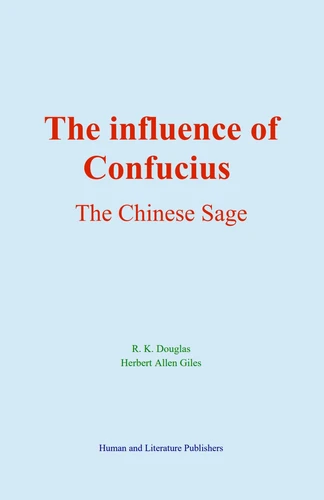The Influence of Confucius. The Chinese Sage
Par : ,Formats :
Disponible dans votre compte client Decitre ou Furet du Nord dès validation de votre commande. Le format Multi-format est :
- Pour les liseuses autres que Vivlio, vous devez utiliser le logiciel Adobe Digital Edition. Non compatible avec la lecture sur les liseuses Kindle, Remarkable et Sony
 , qui est-ce ?
, qui est-ce ?Notre partenaire de plateforme de lecture numérique où vous retrouverez l'ensemble de vos ebooks gratuitement
Pour en savoir plus sur nos ebooks, consultez notre aide en ligne ici
- FormatMulti-format
- ISBN978-2-38111-852-9
- EAN9782381118529
- Date de parution27/10/2023
- Protection num.NC
- Infos supplémentairesMulti-format incluant ePub avec ...
- ÉditeurHuman and Literature Publishing
Résumé
Confucius is the Latinized name of Kung Futusze, or "Master Kung" whose work in China did much to educate the people in social and civic virtues. He began as a political reformer at a time when the empire was cut up into a number of petty and discordant principalities. As a practical statesman and administrator, he urged the necessity of reform upon the princes whom one after another he served. His advice was invariably disregarded, and as he said "no intelligent ruler arose in his time." His great maxims of submission to the emperor or supreme head of the state he based on the analogous duty of filial obedience in a household, and his very spirit of piety prevented him from taking independent measures for redressing the evils and oppressions of his distracted country.
His moral teachings are not based on any specific religious foundation, but they have become the settled code of Chinese life, of which submissiveness to authority, industry, frugality, and fair dealing as prescribed by Confucian ethics are general characteristics.
The political doctrines of this great reformer were eventually adopted, and his teaching and example brought about a peaceful and gradual, but complete revolution, in the Chinese Empire, whose consolidation into a simple kingdom was the practical result of this sage's influence.
The political doctrines of this great reformer were eventually adopted, and his teaching and example brought about a peaceful and gradual, but complete revolution, in the Chinese Empire, whose consolidation into a simple kingdom was the practical result of this sage's influence.
Confucius is the Latinized name of Kung Futusze, or "Master Kung" whose work in China did much to educate the people in social and civic virtues. He began as a political reformer at a time when the empire was cut up into a number of petty and discordant principalities. As a practical statesman and administrator, he urged the necessity of reform upon the princes whom one after another he served. His advice was invariably disregarded, and as he said "no intelligent ruler arose in his time." His great maxims of submission to the emperor or supreme head of the state he based on the analogous duty of filial obedience in a household, and his very spirit of piety prevented him from taking independent measures for redressing the evils and oppressions of his distracted country.
His moral teachings are not based on any specific religious foundation, but they have become the settled code of Chinese life, of which submissiveness to authority, industry, frugality, and fair dealing as prescribed by Confucian ethics are general characteristics.
The political doctrines of this great reformer were eventually adopted, and his teaching and example brought about a peaceful and gradual, but complete revolution, in the Chinese Empire, whose consolidation into a simple kingdom was the practical result of this sage's influence.
The political doctrines of this great reformer were eventually adopted, and his teaching and example brought about a peaceful and gradual, but complete revolution, in the Chinese Empire, whose consolidation into a simple kingdom was the practical result of this sage's influence.



